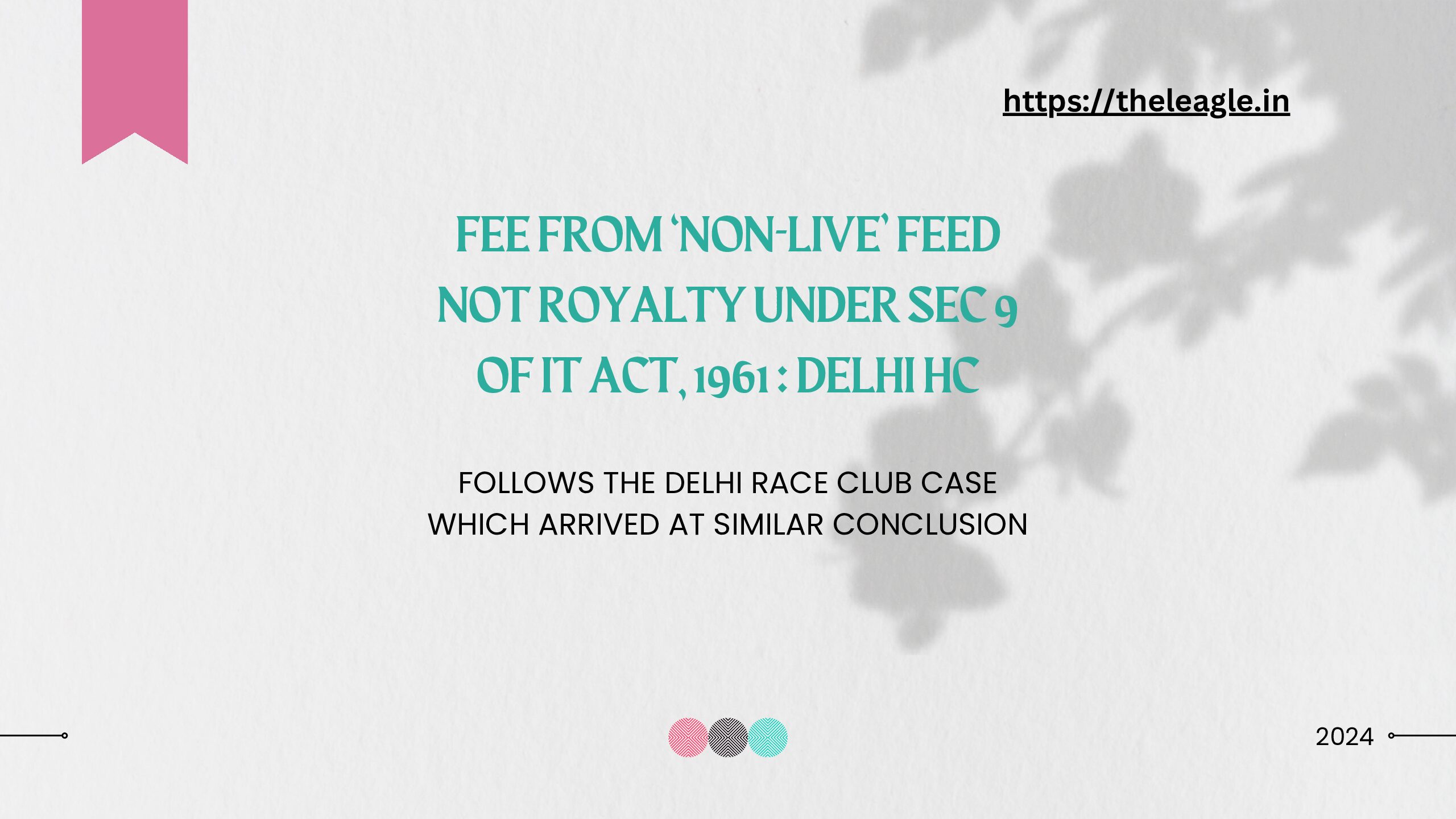The Delhi High Court in a recent decision[1] held that the fee attributable to ‘non-live’ feed cannot be categorized as royalty under Section 9(1)(vi) of the IT Act, 1961. The High Court relied on the observations in Delhi Race Club case to support its conclusions.
Facts
The assessee entered into a tripartite agreement – titled as the ‘Novation Agreement’ – with ESS Singapore and Star India Private Limited by way of which various existing agreements regulating distribution of channels, ads, etc. came to be novated. For the Assessment Year 2015-16, the assessee offered an amount of Rs 65,44,67,199/- as royalty income subject to tax under Section 9(1)(vi) of the IT Act, 1961. The Assessing Officer questioned the assessee as to why out of total income of Rs 1181.63 crores only Rs 65,44,67,199/- was offered for taxation as royalty. The assessee replied that only the income attributable to ‘non-live’ feed was taxable as royalty while the income attributable to ‘live’ feed would not fall within the ambit of royalty as contemplated under Section 9(1)(vi).
The ITAT noted that in the agreement, under the head of ‘consideration’ the parties acknowledge and agree that 95% of the commercial fee is attributable to live feed and 5% to the non-live feed. The ITAT concluded that the fee from non-live feed would not be covered within the ambit of royalty. The ITAT’s view was assailed by the Revenue before the Delhi High Court.
Arguments and Decision
The arguments were straightforward with the Revenue contending that the fee from ‘non-live feed’ was covered within the scope of royalty under Explanation 2 of Section 9(1)(vi) of the IT Act, 1961. The assessee contended otherwise, primarily relying on, Delhi Race Club case ratio.
The Delhi High Court cited the ratio of Delhi Race Club case where it was held that live telecast/broadcast is not a work under Section 2(y) of the Copyright Act and thus a live telecast/broadcast would have no copyright. The Delhi High Court in the Delhi Race Club case held that copyright and broadcast reproduction rights are two separate rights and the two rights though akin are nevertheless separate and distinct. Expressing its concurrence with the ratio of Delhi Race Club case, the Delhi High Court in the impugned case observed that:
In light of the unequivocal conclusions as expressed by the Division Bench in Delhi Race Club and with which we concur, we find that once the Court came to the conclusion that a live telecast would not fall within the ambit of the expression „work‟, it would be wholly erroneous to hold that the income derived by the assessee in respect of „live feed‟ would fall within clause (v) of Explanation 2 to S.9(1)(vi) of the Act. (para 10)
The Delhi High Court in the impugned case was correct and prudently followed the well-reasoned ratio of Delhi Race Club case. The Revenue in an attempt to bring fee from ‘live’ feed within the ambit of royatly, in the impugned case, also sought to place assessee’s income under Explanation 6 to Section 9(1)(vi) which states as follows:
… the expression “process” includes and shall be deemed to have always included transmission by satellite (including uplinking, amplification, conversion or down-linking of any signal), cable, optic fibre or by any other similar technology, whether or not such process is secret;
The Delhi High Court correctly rejected the Revenue’s argument noting that Explanation hinges on transmission being via satellite while in the impugned case the transmission happened via SIPL.
Conclusion
The Delhi High Court made additional observations on the relationship of international tax law and domestic law and how the former overrides the later. (paras 15-17) From the judgment and the arguments reproduced in the judgment, the context and relevance of international tax law is not entirely clear. Most likely, the High Court was trying to underline that the definition of royalty under the IT Act, 1961 can be amended by the legislature, but if the definition of royalty in the applicable Double Taxation Avoidance Agreement is more beneficial to the assessee it would apply. Or that the definition in an international agreement cannot be negated via domestic actions alone. Nonetheless, the relevance of the High Court’s observations on international tax law are not immediately apparent.
[1] The Commissioner of Income Tax, International Taxation v Fox Network Group Singapore PTE Ltd TS-28-HC-2024DEL
